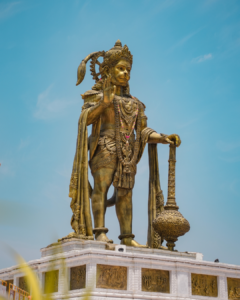Why Tulsi is a Medicinal Plant? Some Scientific Explanation

Table of Contents
Popularly known as Holy Basil, Ocimum sanctum, Tulsi has not only been among the most sacred plants of Hinduism but it has also been scientifically one of the highly researched medicinal plants in medicine. Recognized for therapeutic effects, over the centuries, it is employed in traditional medicine, especially associated with Ayurvedic medicine. The reason modern science still views it as a plant of miracles is because of the health benefits Tulsi offers, which have been supported through various studies confirming its medicinal values.
Here is why Tulsi is said to be a medicinal plant with scientific data that supports it:
1. Rich Antioxidants in Tulsi
This is supported by the plethora of various phenolic compounds, especially flavonoids, flavones, and other polyphenols. Antioxidant property studies prove that Tulsi contains considerable amounts of eugenol. It is already well documented to be a very efficient antioxidant agent as well as an anti-inflammatory agent. The study in the International Journal of Pharmaceutical Sciences and Research in 2010 showed high antioxidant activity that may also help neutralize free radicals, which could lead to cell damage and age-related pathologies, like cancer.
2. Anti-Inflammatory Properties
Anti-inflammatory action is known to be exhibited by Tulsi, which scientific evidence proves. A few bioactive components of Tulsi are the volatile oils and the flavonoids, which restrict the synthesis of most pro-inflammatory cytokines. One study undertaken in 2003 has shown one active chemical of the plant that was eugenol– it reduced inflammation and pain significantly. Hence, this helps in diseases such as arthritis, inflammatory bowel disease (IBD), or IBD.
3. Boosts Immune System
Various scientific studies ascribe to the immunomodulation role of Tulsi, whereby the essential oils, eugenol, and rosmarinic acid have shown antimicrobial action. It is reported that the variety of Tulsi possesses antimicrobial activity against most categories of pathogens, including bacteria, fungi, and viruses, which in turn, make them highly powerful in enhancing bodily immunity against infections, the common cold, and influenza, reported by the Indian Journal of Experimental Biology, 2009.
4. Adaptogenic Herb
The botanical name for Tulsi is believed to be an adaptogen; hence, it helps the body respond to stress. In fact, this has been validated in research as the Journal of Ayurveda and Integrative Medicine reported that in 2013, Tulsi decreases levels of cortisol, or more correctly defined, the level of a hormone evoked by physical and/or psychological stress. This, in effect, is the return to baseline of various bodily functions’ responses in stress responses, which therefore improves physical and psychosocial resiliency.
5. Controls Blood Sugar Level
This was one reason for which Tulsi, regarding the role of blood sugar control, was observed in various studies. A 2013 clinical trial reported in Diabetes Research and Clinical Practice that Tulsi lowered fasting blood glucose levels by a significant amount and increased insulin sensitivity among patients with type 2 diabetes. The study concluded that Tulsi possesses anti-hyperglycemic properties and hence helps control diabetes as well as its complications.
6. Good for the Heart
It reduces the rate at which blood pressure rises because of its properties, like basil, which are good for cardiac health. Also, in a study made in 2008, which was published in the Journal of Medicinal Food, the bioactive compounds presented in Tulsi reported their activities of antioxidant suppression, and it reduced the oxidative damage to the heart, LDL cholesterol—or generally defined as bad cholesterol—along with triglycerides were taken to the minimum in blood—and hence improved lipid profile. Other studies reported that the extracts of Tulsi leaf extract taken on a regular basis lowered the blood pressure among hypertensive subjects. As cited from Indian Journal of Pharmacology, 2011.
7. Supports Respiratory Health
Tulsi is globally known to cure respiratory problems. Evidence came from a study published in the Journal of Ethnopharmacology (2011) which cited that Tulsi possesses bronchodilatory action which helped treat asthma and bronchitis. Anti-inflammatory and antimicrobial action of Tulsi was highly effective in respiratory infections, coughs, and colds.
8. Detoxifies the Body
Generally, Tulsi acts as an excellent detoxifier and helps in normal liver functions and detoxification processes. Results from a 2012 study published in Food and Chemical Toxicology showed that bioactive eugenol and ursolic acid present in Tulsi prevent the liver from any form of toxic injury arising due to environmental toxins, certain industrial chemicals, or even from the side effects of drugs. It improves metabolic activity for good health.
9. Supports Skin Health
Antibacterial, antifungal, and anti-inflammatory action of Tulsi goes much deeper into the skin. This 2015 research from the Indian Journal of Dermatology puts across that Tulsi has expressed antimicrobial property that is useful in the treatment of acnes, eczema, and other cutaneous disorders. Its blood-purifying effects also reduce the oxidative stress to clear off skin and keep it healthier.
10. Improves Digestion
It helps digest food by increasing the amount of digestive enzymes. Even a 2012 report in the Journal of Ethnopharmacology confirmed that Tulsi was of value in the management of indigestion, gastric ulcers, and bloating. Its antimicrobial action aids in controlling gut bacteria to help with the proper digestion and absorption of nutrients.
Conclusion
Though Tulsi holds a special place in the Hindu religion, its medicinal significance finds a place in modern science today. From antioxidant and anti-inflammatory effects, maintaining cardiac health, blood sugar regulation, and respiration, Tulsi proves to be priceless in the attempt for general well-being. This herbal adaptogen works in the direction of granting a natural way of increasing immunity, stress reduction, and protection against chronic diseases upon its regular usage. Probably, it is one of the best among all herbal remedies that science has ever known.


2025 Mahavir Jayanti: Date, History, Significance & Celebrations




